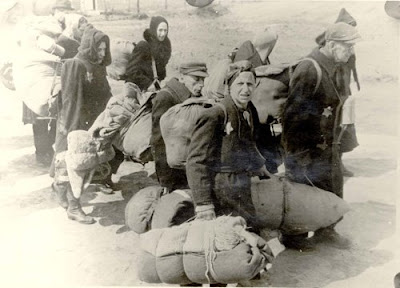
Over Yom Tov there was lots of discussion amongst the Yungeleit about Chabad not saying Akdomus or Megillas Rus. They wanna know why not? It seems like there's more of an awakening these days. They wanna know "Mah Nishtana?" us from them? I don't think it's a lack of pride or doubting their ways, just a bechina of da mah sheToshiv. Ok, OK, calm down, all of you. I wasn't calling you Apikorsim, it's only a figure of speech. Really. All this discussion gets one thinking: In my humble opinion there's a moment on Yom Tov when one could say that at that moment was his Kabbolas HaTorah. Vos heist? Well, you might say that Kabbolas HaTorah happens when one accepts upon himself Hachlotos Tovos in the realm of learning and being a better Jew. That moment most likely doesn't happen during Shavuos night - whether you learn BeHasmodoh Rabboh or say "Tikkun" like a boorish Chossid - at least that's how I see it. There isn't that one moment anytime during the night, it just doesn't lend itself to it, I'm sorry to say. You can't tell me that when you're arguing over the Pshat in a tosfos that you feel any different than on a poshuter Mitvoch. The same goes for the "Tikkun-sayers;" It doesn't happen between Mitzvas Asey 112 to 113.
After some thought I figured it out. If you've ever been to a Rebbe or a Gutter Yid where he does the honors you know what I mean. It's not the Aseres HaDibros that one feels the moment. After all, exactly which of the Dibros would cause that? I'll go out on a limb here and say that it happens during Akdomus. Pick and choose the posuk that most suits the need, but it happens. There's the fact that there was all this preparation with the cheder yinglech. The Rebbe/Gutter Yid is on a high, BeHislahavus Atzumah, and the Oylem reciprocates. At that time, when the Rebbe/GY is saying his two pesukim, then the oylem has a chance to contemplate the meaning of the YT, and what is expected of them. You might say it was like the hefsek between the sets of tekios, where the Baal Tokea either says a יה"ר or is מתודה בלחש, those seconds can be very precious if utilized properly. If you think these are the thoughts of a foolish Hungarian wannabe like myself, think again. Several people told me לפי תומם when I asked them about it that this was the closest thing to the truth. That despite their misgivings about frum society as a whole saying Akdomus at so-and-so's minyan KeVosikin you mamesh feel like you're elevated to the highest spheres. "Like you're at barg sinai," like one fellow told me.
I may have written here once about my zeide's trip to Kosoni for Shavuos, 1943, to the Rebbe di "Ohr Mooleh," HY"D. The Kosonyer bichlal was known to daven עד אפיסת הכחות ממש, and Shavuos was no exception. My zeide told us how מ'האט געשפירט ווי מ'שטייט ממש ביים בארג סיני. Take that for what it's worth, but I would think that a whole lotta of Tshuvah - especially in 1943 - was done at those moments. I'm not here to judge whether or not those undertakings during Shavuos morning are sincere or not; the fact remains that they're there. They exist. They happen. Whether or not we keep them is another discussion for another time. So we've taken care of a large segment of the Charedi population: Most Chassidim and maybe some pockets of Hungarians like Erloi and Vien. I don't think Yeshivishe places koch zich in Akdomus, even if they do say it, so you might say that they share the problem with Lubavitchers. When is their moment and when is mine? We're a generation that needs our Chitzoniyus, we cannot do it like the previous ones did. When was I supposed to experience it? למה נגרע?! I see that the procession of VIPs to the Kotel is going on all week in Yerushalayim, there's Tashlumin Kol Shivah. Can I have that week to make up for the missed experience?!



















